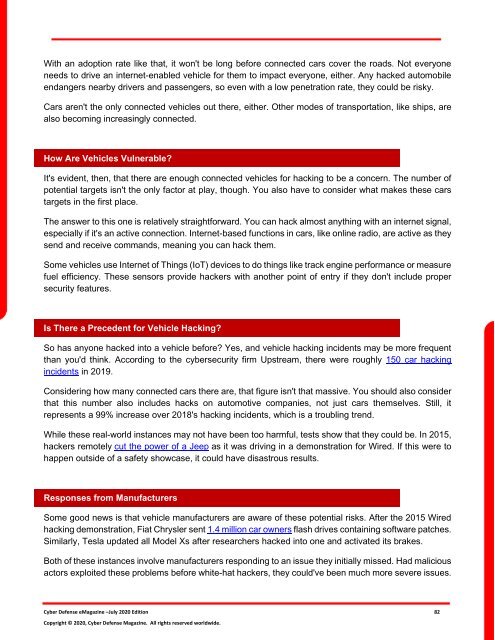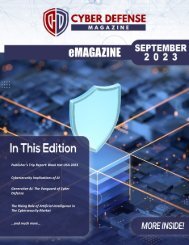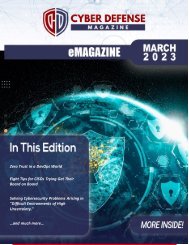Cyber Defense eMagazine July 2020 Edition
Cyber Defense eMagazine July Edition for 2020 #CDM #CYBERDEFENSEMAG @CyberDefenseMag by @Miliefsky a world-renowned cyber security expert and the Publisher of Cyber Defense Magazine as part of the Cyber Defense Media Group as well as Yan Ross, US Editor-in-Chief, Pieruligi Paganini, Co-founder & International Editor-in-Chief, Stevin Miliefsky, President and many more writers, partners and supporters who make this an awesome publication! Thank you all and to our readers! OSINT ROCKS! #CDM #CDMG #OSINT #CYBERSECURITY #INFOSEC #BEST #PRACTICES #TIPS #TECHNIQUES
Cyber Defense eMagazine July Edition for 2020 #CDM #CYBERDEFENSEMAG @CyberDefenseMag by @Miliefsky a world-renowned cyber security expert and the Publisher of Cyber Defense Magazine as part of the Cyber Defense Media Group as well as Yan Ross, US Editor-in-Chief, Pieruligi Paganini, Co-founder & International Editor-in-Chief, Stevin Miliefsky, President and many more writers, partners and supporters who make this an awesome publication! Thank you all and to our readers! OSINT ROCKS! #CDM #CDMG #OSINT #CYBERSECURITY #INFOSEC #BEST #PRACTICES #TIPS #TECHNIQUES
You also want an ePaper? Increase the reach of your titles
YUMPU automatically turns print PDFs into web optimized ePapers that Google loves.
With an adoption rate like that, it won't be long before connected cars cover the roads. Not everyone<br />
needs to drive an internet-enabled vehicle for them to impact everyone, either. Any hacked automobile<br />
endangers nearby drivers and passengers, so even with a low penetration rate, they could be risky.<br />
Cars aren't the only connected vehicles out there, either. Other modes of transportation, like ships, are<br />
also becoming increasingly connected.<br />
How Are Vehicles Vulnerable?<br />
It's evident, then, that there are enough connected vehicles for hacking to be a concern. The number of<br />
potential targets isn't the only factor at play, though. You also have to consider what makes these cars<br />
targets in the first place.<br />
The answer to this one is relatively straightforward. You can hack almost anything with an internet signal,<br />
especially if it's an active connection. Internet-based functions in cars, like online radio, are active as they<br />
send and receive commands, meaning you can hack them.<br />
Some vehicles use Internet of Things (IoT) devices to do things like track engine performance or measure<br />
fuel efficiency. These sensors provide hackers with another point of entry if they don't include proper<br />
security features.<br />
Is There a Precedent for Vehicle Hacking?<br />
So has anyone hacked into a vehicle before? Yes, and vehicle hacking incidents may be more frequent<br />
than you'd think. According to the cybersecurity firm Upstream, there were roughly 150 car hacking<br />
incidents in 2019.<br />
Considering how many connected cars there are, that figure isn't that massive. You should also consider<br />
that this number also includes hacks on automotive companies, not just cars themselves. Still, it<br />
represents a 99% increase over 2018's hacking incidents, which is a troubling trend.<br />
While these real-world instances may not have been too harmful, tests show that they could be. In 2015,<br />
hackers remotely cut the power of a Jeep as it was driving in a demonstration for Wired. If this were to<br />
happen outside of a safety showcase, it could have disastrous results.<br />
Responses from Manufacturers<br />
Some good news is that vehicle manufacturers are aware of these potential risks. After the 2015 Wired<br />
hacking demonstration, Fiat Chrysler sent 1.4 million car owners flash drives containing software patches.<br />
Similarly, Tesla updated all Model Xs after researchers hacked into one and activated its brakes.<br />
Both of these instances involve manufacturers responding to an issue they initially missed. Had malicious<br />
actors exploited these problems before white-hat hackers, they could've been much more severe issues.<br />
<strong>Cyber</strong> <strong>Defense</strong> <strong>eMagazine</strong> –<strong>July</strong> <strong>2020</strong> <strong>Edition</strong> 82<br />
Copyright © <strong>2020</strong>, <strong>Cyber</strong> <strong>Defense</strong> Magazine. All rights reserved worldwide.


















